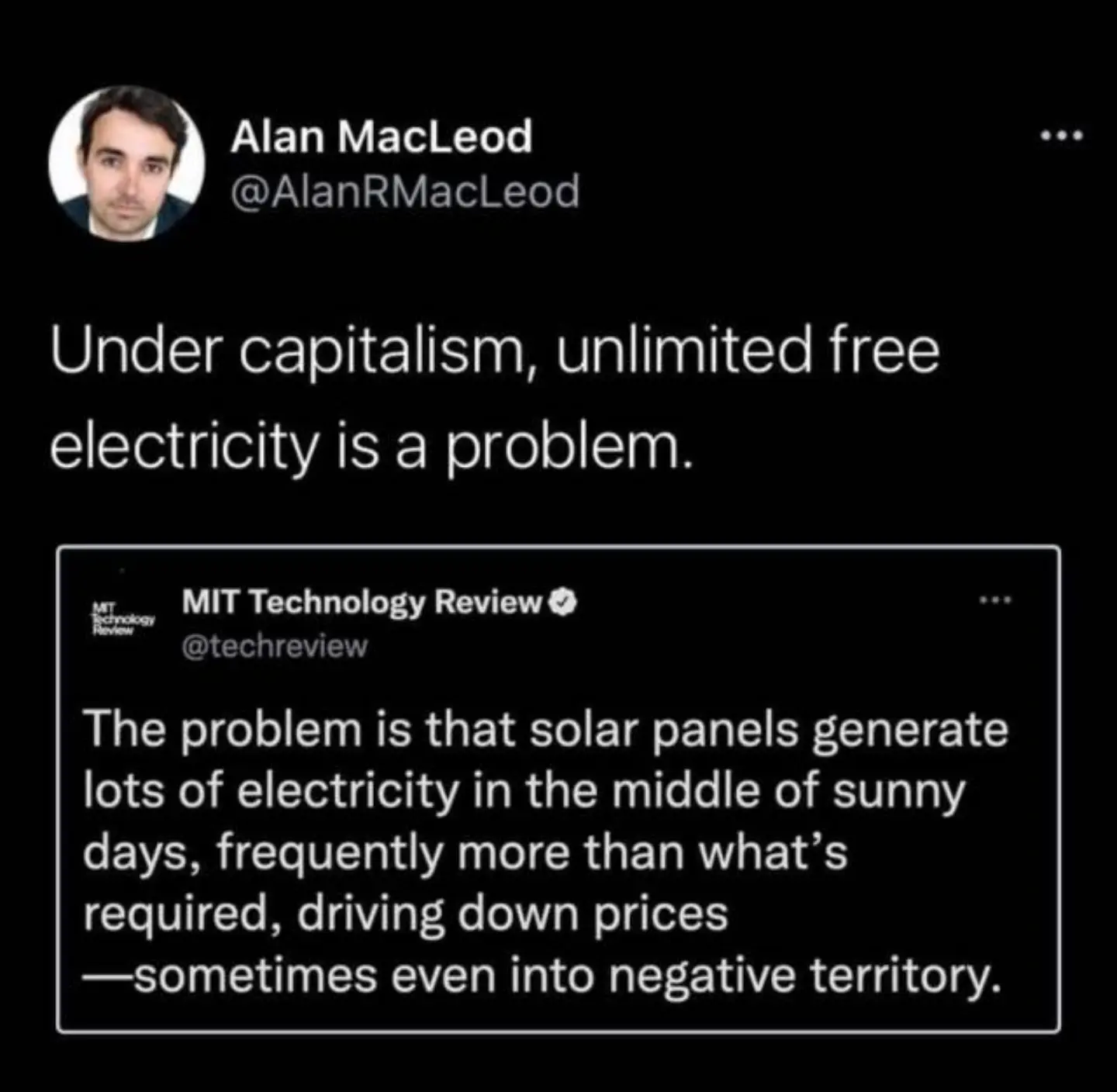this post was submitted on 09 Apr 2024
1662 points (96.0% liked)
Solarpunk
6103 readers
61 users here now
The space to discuss Solarpunk itself and Solarpunk related stuff that doesn't fit elsewhere.
Join our chat: Movim or XMPP client.
founded 3 years ago
MODERATORS
you are viewing a single comment's thread
view the rest of the comments
view the rest of the comments

We do have wireless charging for phones, and induction stoves that transfer heat. And yes there was a bit of a conspiracy regarding Tesla, it is quite famous, but I will leave you to direct your own studies there however you see fit. One part is that Edison was not so much the "inventor" as his reputation may naively lead people to believe as an "exploiter" as in he ran an invention sweatshop company. But anyway you are right to be suspicious of Tesla ofc - he wasn't very practical and maybe it was after being burned by his experiences with Edison but he did not set out to prove his ideas in the most practical manner and instead went off the deep end trying to solve the more scientific and engineering aspects further rather than take forward what he had already shown irt short distance transfers. So the conspiracy wasn't "huge", just a consequence of him having been blacklisted by Edison combined with his own business ineptitude to not find financial backers. I am only saying though that the limitations were not entirely physical (the long distance ones are, but not the short distance ones), so much as practicality especially in the business sense of taking a product from conception all the way to market.
Yeah, obviously induction charging has been around (and is easy enough to monetise), but he was famously trying to build a way to transfer electricity over long distances, and I'm assuming this isn't possible without incurring huge losses.
Agree on all you said about Edison, he basically was that eras Elon Musk, taking credit for the work of others.
Yes, I believe you are correct about that, although I too do not know what precisely those limitations are:-).
For one thing, Tesla was not entirely truthful to his investors:
And for another, he chased down the wrong path for awhile:
So, it is not quite a full "conspiracy" to claim that he somehow deserved additional funding despite all of his past shortcomings. It sounds to me more like hindsight being 20/20, we now realize how he was correct, how he was wrong, and overall people try to use him as an example of capitalism's failings. Like the first rule of inventions are that when one fails you should try try again, except that's obviously not true - yeah try a few times but ultimately spend your time on what looks most likely to work, not repeating to extend forward a string of endless failures. i.e., people try to use his example in spite of the facts, not because of them. Maybe, it looks like.
And it's likely true - if as much effort had been put into that technology as was put into Edison's, perhaps we really would have solved that long-distance problem by now - maybe. Therein lies the germ of truth imho: you cannot overcome it if you refuse to even so much as try? So in that case, it is truly the constraints of capitalism that killed the spirit of innovation there, as in we could (maybe) have had something, if only profits were not people's sole motivation.
Similarly and in a much more damaging manner we see drug companies researching palliatives and "care options" rather than actual cures. The goal of any corporation - even ones working in a medical field - is solely to make profits. Hence Viagra and Cialis, and funding goes towards further development of pain relief and such, even as funding was taken away from research towards cures for common diseases (even ones the researchers themselves believed they were "close" to solving!).
All of this works together as arguments against capitalism being the best economic system - it works well in theory but only up to a point, similar to socialism, and irl the systems that have worked the absolute best was a blending of the two, with each providing a different mixture of benefits and detractions. e.g. if Tesla had been under a socialist system or in more of a blended one, could his excesses have been reigned in and what innovations would we have today in that case? We will never know ofc, but at least I am attempting to frame the argument that I commonly hear from people who don't quite state their reasoning, so this is my attempt to reconstruct it. :-)
I guess I should've started with the wiki article, which spells out he was working off the erroneous assumption that the atmosphere was somehow more conductive than it really is.
Anyway, thanks for the interesting discussion.